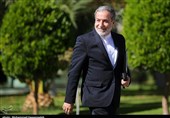US Blocks Vote on UN's Bid for Global Ceasefire over Reference to WHO
TEHRAN (Tasnim) – The US blocked a vote on a UN Security Council resolution calling for a global ceasefire during the Covid-19 pandemic, because the Trump administration objected to an indirect reference to the World Health Organization.
The Security Council has been wrangling for more than six weeks over the resolution, which was intended to demonstrate global support for the call for a ceasefire by the UN secretary general, Antonio Guterres. The main source for the delay was the US refusal to endorse a resolution that urged support for the WHO’s operations during the coronavirus pandemic.
US President Donald Trump has blamed the WHO for the pandemic, claiming (without any supporting evidence) that it withheld information in the early days of the outbreak.
China insisted that the resolution should include mention and endorsement of the WHO.
On Thursday night, French diplomats thought they had engineered a compromise in which the resolution would mention UN “specialized health agencies” (an indirect, if clear, reference to the WHO).
The Russian mission signaled that it wanted a clause calling for the lifting of sanctions that affected the delivery of medical supplies, a reference to US sanctions imposed on Iran and Venezuela. However, most Security Council diplomats believed Moscow would withdraw the objection or abstain in a vote rather than risk isolation as the sole veto on the ceasefire resolution.
On Thursday night, it appeared that the compromise resolution had the support of the US mission, but on Friday morning, that position switched and the US “broke silence” on the resolution, raising objection to the phrase “specialist health agencies”, and blocking movement towards a vote.
“We understood that there was an agreement on this thing but it seems that they changed their mind,” a western security council diplomat said, The Guardian reported.
“Obviously they have changed their mind within the American system so that wording is still not good enough for them,” another diplomat close to the discussions said. “It might be that they just need a bit more time to settle it amongst themselves, or it might be that someone very high up has made a decision they don’t want it, and therefore it won’t happen. It is unclear at this moment, which one it is.”
A spokesperson for the US mission at the UN suggested that if the resolution was to mention the work of the WHO, it would have to include critical language about how China and the WHO have handled the pandemic.
“In our view, the council should either proceed with a resolution limited to support for a ceasefire, or a broadened resolution that fully addresses the need for renewed member state commitment to transparency and accountability in the context of Covid-19. Transparency and reliable data are essential to helping the world combat this ongoing pandemic, and the next one,” the spokesperson said.
While the force of the resolution would be primarily symbolic, it would have been symbolism at a crucial moment. Since Guterres made his call for a global ceasefire, armed factions in more than a dozen countries had observed a temporary truce. The absence of a resolution from the world’s most powerful nations, however, undermines the secretary general’s clout in his efforts to maintain those fragile ceasefires.
Talks will continue next week at the Security Council to explore whether some other way around the impasse can be found.






